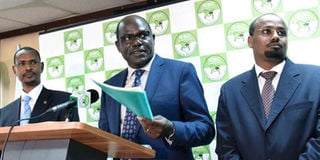Chebukati says remaining IEBC commissioners are staying put

The electoral commission chairman Wafula Chebukati (centre) with fellow commissioners Prof Abdi Guliye (left) and Mr Molu Boya during a press briefing at the IEBC headquarters in Anniversary Towers in Nairobi on April 20, 2018. PHOTO | ANTHONY OMUYA | NATION MEDIA GROUP
What you need to know:
- Only three commissioners have been left in the IEBC Commission after Monday resignations.
- Mr Chebukati says the law is on their side and that most commissioner have between three and nine members.
- The three resigned saying they did not have confidence in the leadership of Mr Chebukati.
The electoral commission chairman Wafula Chebukati has declared that he is going nowhere and that the commission as currently constituted is rightfully in place, asking those who have issues and want the remaining three commissioners out to follow the law to remove them from office.
Speaking for the first time since resignation of three commissioners after he sent the Secretariat’s chief executive officer, Ezra Chiloba, on compulsory leave, Mr Chebukati asked Parliament to expedite changes to the law to facilitate the recruitment of new commissioners to fill the vacant positions.
“The Constitution provides that independent commissions have membership of between three and nine commissioners. We are three and we are properly constituted to execute the mandate of the commission,” he said.
BOTCHED MEETING
Mr Chebukati spoke on the day a sharp split emerged in the Senate committee on Justice, Legal Affairs and Human Rights following its botched meeting with the commissioners.
The committee, chaired by Nandi Senator Samson Cherargei, had on April 18 written to the Independent Electoral and Boundaries Commission (IEBC) inviting the three commissioners to appraise the team on the decision to send Mr Chiloba on compulsory leave.
The three commissioners had confirmed attendance, only for the meeting to be called off in a manner that left some members of the committee seething in rage.
In a series of tweets, IEBC communication department suggested that the commissioners were on their way to the meeting when it was called off.
This was confirmed by Mr Chebukati during the press conference in which he reiterated that, while on the way to the meeting, they had received a message from the committee postponing the meeting to a later date.
He didn’t say who sent the text message but it later emerged that the chairman of the committee had called off the meeting without consulting the members who had already mobilised for the meeting.
RESIGNATIONS
On Monday this week, vice chairperson Consolata Nkatha Maina and commissioners Margaret Mwachanya and Paul Kurgat resigned from the commission, saying they had no confidence in Mr Chebukati’s leadership.
Under Mr Chebukati’s leadership, they said, “the commission boardroom has become a venue for peddling misinformation, grounds for brewing mistrust, and a space for scrambling for and chasing individual glory and credit.”
While the trouble in the commission has been simmering since the nullification of the August 8, 2017 elections, it is the suspension of Mr Chiloba that broke the camel’s back.
Mr Chebukati made the decision to push out the CEO with the support of commissioners Abdi Guliye and Boya Molu. Ms Maina and Dr Kurgat walked out of the meeting in protest while Ms Mwachanya was away.
FALLING OUT
While insisting that they were not against due process in the case against Mr Chiloba the three accused Mr Chebukati of failing to follow the due process.
But on Friday Mr Chebukati, who was flanked by Mr Molu and Prof Guliye, took a swipe at the three, saying that discrediting his name was in bad taste and perpetuates an agenda that can only undermine the independence of the commission.
“I have led the commission not just with professionalism but with unwavering dedication even when circumstances seemed impossible. I have diligently provided leadership when the commission came under sharp scrutiny,” he said, arguing that the claims made by the three had no legal basis.
He defended himself against the accusation that he had suspended Mr Chiloba without following due procedure.
“The main issue in question which the country must demand answers to is simple and clear – have public resources been utilised prudently and in accordance with the law?” he asked, then declared: “Everything else is a distraction.”




